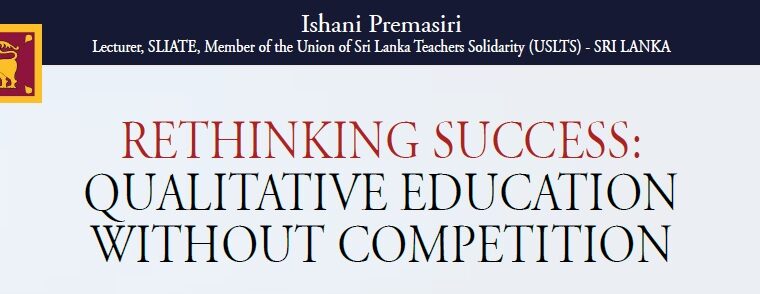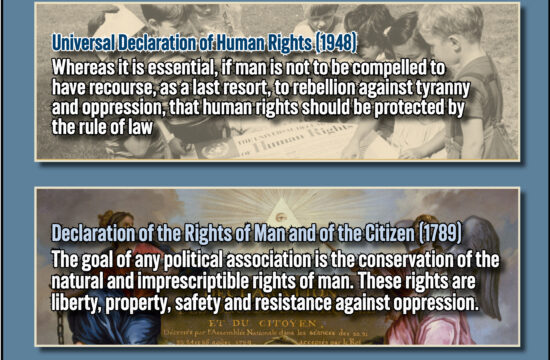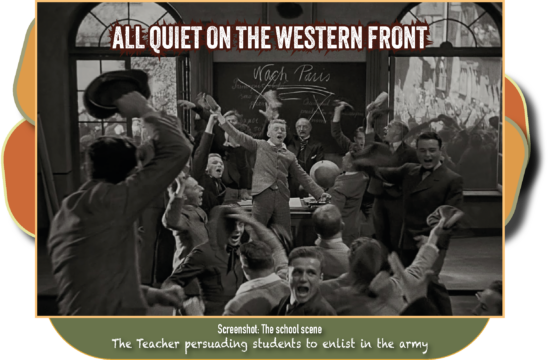Ishani Premasiri
Lecturer, SLIATE, Member of the Union of Sri Lanka Teachers Solidarity (USLTS) – SRI LANKA
The traditional model of education, which emphasizes competition for grades, university placements, and success in life, is being increasingly challenged by educators and thinkers who believe that there are other ways to promote academic excellence and achievement that better serve the needs and interests of students, especially in a world where emotional intelligence, creativity, collaboration, and adaptability are becoming increasingly important skills.
Qualitative education without competition aims to foster a love of learning and personal growth, rather than emphasizing grades and rankings. It prioritizes quality of learning experiences, with a focus on deep understanding, critical thinking, and emotional intelligence. This approach aims to create individuals who are not only academically competent, but also innovative, creative, and emotionally intelligent, and who are better equipped to handle the complex challenges of the modern world.
In an education system without competition, the focus shifts from ranking students to valuing individual progress and strengths. Students are no longer compelled to compete with one another, but instead encouraged to learn at their own pace and cultivate their unique talents and interests.
The Traditional Competitive Framework in education is built upon the idea that competition fosters excellence by ranking students based on grades and test scores, creating a hierarchy of achievement.
The competitive mindset in education can have adverse effects on students, including chronic stress, anxiety, and a negative relationship with learning. In a competitive environment, students may prioritize individual success, which can hamper collaboration, stifle creativity, and hinder broader intellectual, emotional, and social development. This can result in some students with unique talents or learning styles being left behind or undervalued.
Qualitative education without competition redefines success as personal growth rather than comparative achievement. This approach emphasizes nurturing individual strengths and talents, and fostering a supportive and cooperative environment where all students can thrive.
The transition from a competitive to a qualitative education without competition is grounded in educational philosophies that prioritize personal development, intrinsic motivation, and the overall well-being of students.
Constructivist theory of education, proposed by educational theorists like Jean Piaget and Lev Vygotsky, suggests that knowledge is actively constructed by learners as they interact with their environment. In this model, students learn by exploring, discovering, and problem-solving, rather than passively receiving information. A competitive environment can hinder this process, as students may prioritize external rewards over deep understanding and learning.
Humanistic educational theories, inspired by psychologists like Carl Rogers and Abraham Maslow, center the student in the learning process, prioritizing emotional well-being, personal growth, and self-actualization. In this context, education is seen as a means of fostering the full development of individuals, rather than merely preparing them for academic or professional success. Competitive education, which often reduces students to numbers and rankings, clashes with this more compassionate and personalized approach to learning.
Montessori education is an example of qualitative education that downplays competition, as students work at their own pace and are not graded or ranked. Instead, they receive individualized feedback, which helps them focus on personal growth. The Montessori method fosters intrinsic motivation, creativity, and self-discipline, qualities that flourish without the pressure of competition.
Finland’s education system provides a notable example of a successful education system without competition. Finnish students are not subjected to standardized tests or school rankings, and cooperation and personalized learning are highly emphasized.
Various educational models and systems around the world have implemented qualitative education without competition, demonstrating that excelexcellence
and innovation can indeed thrive without rivalry.
Finland’s educational system has garnered acclaim for its non-competitive approach, where students start formal schooling later, have shorter school days, and face little to no standardized testing. Teachers assess students through detailed narrative feedback that focuses on individual progress, and are highly trained with the flexibility to tailor their instruction to the unique needs of their students. This system promotes collaboration among students, who are encouraged to learn from and support each other.
The Montessori education model, implemented in schools worldwide, embodies the ideals of qualitative education without competition. Montessori schools allow students to work at their own pace, selecting activities that interest them. There are no grades or rankings, and children are encouraged to collaborate rather than compete. The focus is on self-directed learning, hands-on experiences, and intrinsic motivation, which results in students excelling academically and developing social and emotional skills in a non-competitive environment.
Project Based Learning (PBL) is another model that aligns well with qualitative education without competition. In PBL environments, students work in teams to solve complex, real-world problems over an extended period. They are evaluated based on the quality of their work and the depth of their understanding, rather than on their performance in comparison to their peers. This approach promotes cooperation, critical thinking, and problem-solving skills, which are vital in today’s world.
Some of the benefits of the qualitativ education without competition are,
1. Fostering Intrinsic Motivation: Without the pressure of competition, students can focus on learning for its own sake. They are more likely to engage deeply with the material, pursue their interests, and develop alifelong love of learning.
2. Improved Mental Health: Removing the stress of competition can lead to improved mental health outcomes for students. The pressure to constantly outperform peers can lead to anxiety, burnout, and depression. A non competitive environment encourages a healthier relationship with learning.
3. Greater Inclusivity: Qualitative education without competition is more inclusive, allowing students of diverse abilities and backgrounds to thrive. In competitive systems, students from disadvantaged backgrounds often struggle to compete on an equal footing. By focusing on personal growth, this model reduces the barriers to success and fosters equity.
4. Collaboration and Social Skills: By encouraging cooperation over competition,
students develop better social skills and emotional intelligence. They learn to work in teams, support one another, and celebrate each other’s successes. These skills are essential for success in the workplace and in life.
While a qualitative, non-competitive education system has the potential to revolutionize education, it faces certain challenges, such as:
1. Cultural Resistance: Many societies associate success with competition, making it difficult to shift away from this mindset. Parents, educators, and policymakers may be reluctant to embrace a system that downplays grades and rankings.
2. Assessment Difficulties: In the absence of standardized tests and grades, assessing student progress can be more subjective. Teachers need to be skilled in providing detailed feedback, and there needs to be a clear and reliable framework for evaluating student growth.
3. Institutional Change: Transitioning to a qualitative, non-competitive education system necessitates substantial changes in educational institutions. Schools need to revamp their curricula, retrain teachers, and adopt new methods for assessing students.
As the world becomes more interconnected and complex, the skills that students need to succeed are changing. Creativity, collaboration, emotional intelligence, and problem-solving are becoming more important than ever. The traditional competitive model of education, which prioritizes test scores and rankings, may no longer be the best way to prepare students for the challenges of the 21st century.











